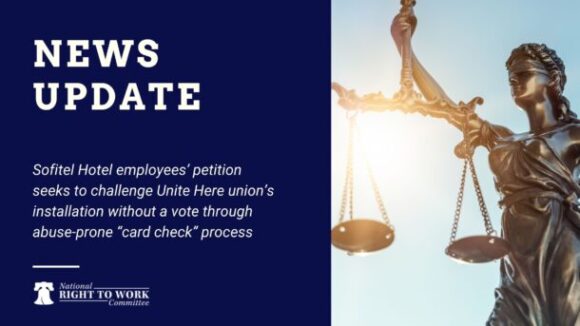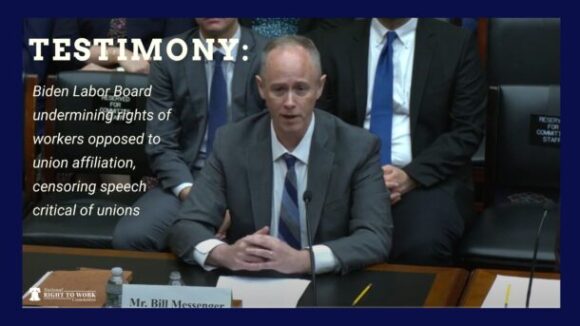Foundation Fires Back Against Biden NLRB ‘Card Check’ Mandate
Brief challenges Labor Board’s attempt to expand coercive, anti-employee organizing scheme
The Advertiser-Tribune of Ohio doesn’t like Big Labor’s effort to eliminate the secret ballot election for workers. In a policy editorial entitled “Preserve Freedom of Secret Ballots,” the paper joins other editorial boards in protesting efforts to enact the Card Check Scam Bill.
If you voted in the Nov. 4 election, you did so privately and secretly. Candidates and their supporters had to stop attempting to win your vote when you stepped within a certain distance of the polling place. That’s the law.
For more than two centuries, Americans have believed that important decisions involving politics ought to be made by secret ballot. It is one of our most cherished, important traditions.
For decades, federal law involving labor unions has abided by that tradition. But big unions want to change that. They want to know how workers vote when asked whether they want to be represented by a union. There can be just one reason for that – to use the power of intimidation to pressure workers to support unions.
Current law requires if a union attempts to organize workers at a particular company, it must ask them to sign cards authorizing a referendum on the issue. The process of collecting signatures on authorization cards is done in public, with no guarantee of privacy for the worker.
If 30 percent of workers at a company sign the cards, the matter is put to a vote. Employees use secret ballots in referendums handled by the National Labor Relations Board. The NLRB counts votes and, if more than 50 percent of workers ask for a union, one is certified.
Too often for the liking of union leaders, the card-signing process goes well but the secret ballot vote does not. That is because, of course, some who sign cards are afraid not to do so. They may simply bow to peer pressure at the time a card is presented to them – and, of course, it always is presented by staunch supporters of unionization. Once they are given ballots with which they can vote secretly, some of those who were intimidated into signing cards vote “no,” defeating the union.
Labor union leaders want to change that – and they have allies among the many members of Congress to whom they have doled out tens of millions of dollars in campaign donations.
The chosen vehicle for change is a bill referred to dishonestly as the “Employee Free Choice Act.” Far from guaranteeing free choice, it would, if enacted, ensure just the opposite. It stipulates that a union must be certified if more than 50 percent of its workers sign authorization cards. The secret ballot process is eliminated.
Already approved by the House of Representatives, the bill has been blocked in the Senate. But unions hope to revive it this year, using the clout they have obtained by supporting many candidates for the Senate.
Make no mistake about it: If the bill is enacted, it will be the end of free choice about whether workers want to join unions. That is why organized labor wants the bill so badly. That is why unions are exerting so much pressure on Congress. That is why, according to some union leaders, it is the unions’ top priority.
If the bill is approved in the Senate, it will mean the end of an important freedom – that of using the secret ballot on an issue of major importance to working men and women.
We urge Sens. Sherrod Brown and George Voinovich to oppose the bill. To do otherwise would serve the interests of big labor union bosses – but not of working men and women.
Brief challenges Labor Board’s attempt to expand coercive, anti-employee organizing scheme

Sofitel Hotel employees’ petition seeks to challenge Unite Here union’s installation without a vote through abuse-prone “card check” process

Testimony: Biden Labor Board undermining rights of workers opposed to union affiliation, censoring speech critical of unions